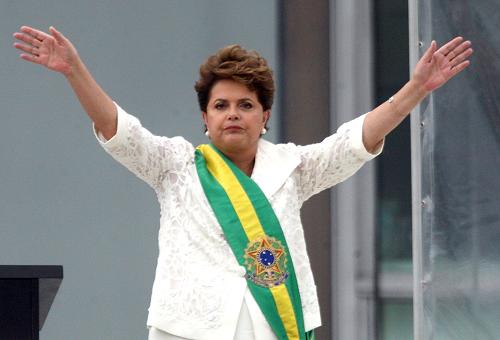Rousseff sworn in as Brazil's 1st female president
Dilma Rousseff was sworn as Brazil 's first female president Saturday at the National Congress in Brasilia, taking over from Luiz Inacio Lula da Silva who had served the biggest South American country for eight years.
Rousseff was sworn in by Senate President Jose Sarney at a solemn ceremony. Michel Temer, 60, also took the oath of office as vice president.
Rousseff and Temer pledged to "maintain, defend and enforce the Federal Constitution, to observe laws, to promote general welfare to the Brazilian people and to sustain Brazil's union, integrity and independence."
Foreign dignitaries attending the ceremony included Venezuelan President Hugo Chavez, Colombian President Juan Manuel Santos, Uruguayan President Jose Mujica, Palestinian President Mahmoud Abbas, Portugal's Prime Minister Jose Socrates.
In her first speech as president, Rousseff promised to consolidate the work of Lula da Silva's government, saying that the "ultimate commitment" of her government will be "to honor the women, to protect the most fragile and govern for all."
She said the outgoing president led the Brazilian people to trust themselves and that "to believe in the power of the people is the greatest lesson that President Lula leaves for us."
Among the achievements of the past eight years, she mentioned the reduction of "our historic social debt, rescuing millions of Brazilians from the tragedy of poverty and allowing millions to reach the middle class."
She pledged to conduct a political reform to "advance our young democracy and to ensure economic stability, especially on prices, as a condition to continue our current growth cycle."
Rousseff also stated that a reform of the tax system, the improvement of industrial park and agriculture in the country are "urgent" to support both major exporters of the sector and family farming.
She pledged to promote the development of all regions of the country, and to integrate works of the federal, state and municipal governments in the areas of health, education and public safety.
"Our priority is the eradication of extreme poverty and creating opportunities for all," she said.
She noted that economic growth associated with strong social programs will be the formula to overcome inequalities, and reaffirmed that her government will maintain the policy to control inflation and strengthen the reserves to prevent external vulnerability.
Her government will defend the adoption of sound economic policies in the field of multilateral forums, and will not make " the slightest concession to protectionism in rich countries."
She stressed that "we can grow in an environmentally sustainable way" and that "we are and will keep being the world champions of clean energy."
"Brazil will not condition its environmental action to commitments by others," she said.
The new government's foreign policy will maintain the commitment to the South American neighbors, linking Brazil's growth to the region and will prioritize relations with Latin American and Caribbean countries, as well as the Middle East and Asia.
Rousseff said she will also deepen ties with the United States and the European Union, and will give special attention to emerging markets.
"The defense of peace does not permit indifference to nuclear proliferation, terrorism and transnational crime," she said, stressing the need for reform of multilateral institutions, particularly the Security Council of the United Nations.
At the end of her speech, Rousseff got emotional when she paid tribute to people who fought for democracy against the military dictatorship in the 1960s and 1970s and were killed.
"I gave Brazil my life. I gave my youth to a dream of a fair and democratic country. I have no regrets and I have no resentment or bitterness. From now on, I am the president of all Brazilians," she said in tears.
Rousseff received the presidential sash from the hands of Lula da Silva in front of the Planalto Palace, in a ceremony that was witnessed by thousands of Brazilians who gathered at the Three Powers Square adjacent to the palace.
With a record approval rating of 87 percent, Lula da Silva left the government after two consecutive four-year terms, the maximum allowed under Brazilian law.
A poll released this week indicated that 64 percent of Brazilians considered that Brazil "has developed considerably" under his leadership.
 0
0 








Go to Forum >>0 Comments